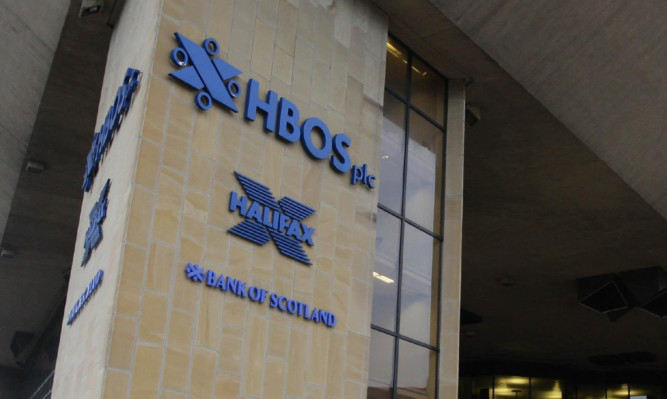Up to 10 senior managers at HBOS in the run-up to its collapse could be banned from working in the City after the much-delayed publication of two damning reports into the bank’s demise.
City watchdogs will look at taking potential further action against former HBOS senior management – including ex-chief executives Andy Hornby and James Crosby, as well as past chairman Lord Stevenson – after a report by Andrew Green QC blasted former regulators for their failure to investigate a raft of executives.
They could face being struck off from working in the financial services industry, while the Insolvency Service also has the power to ban them from being directors of any company.
In their long-awaited review of the HBOS saga (PDF link), the Financial Conduct Authority (FCA) and Prudential Regulation Authority (PRA) put the blame firmly on the bank’s executives, saying they were “ultimately responsible” for the demise of HBOS, which had to be rescued by Lloyds and bailed out with £20.5 billion of taxpayer cash in 2008.
Only one former HBOS executive, Peter Cummings, has so far been formally investigated and fined.
But it is the separate report by Mr Green published alongside the main review that is the most revelatory, providing a scathing assessment of the now disbanded Financial Services Authority (FSA) and its handling of the original inquiries into HBOS.
Mr Green said the regulator should have investigated Mr Hornby, Mr Crosby and Lord Stevenson, as well as a number of other key executives.
He also named other former senior managers at the bank that the FSA should have looked into investigating, including Mike Ellis, former finance director, Colin Matthew, ex-head of the international division and Lindsay Mackay, former boss of the treasury division.
The FCA and PRA will now review whether to take any enforcement action against the bankers.
But any decision will not come until next year and it could be another 18 months to two years before regulators can enforce bans.
The Department for Business, Innovation and Skills (BIS) said the Insolvency Service decided two years ago not to ban HBOS executives from working as company directors, but could review this if the FCA and PRA inquiry throws up new evidence.
The Green report said the FSA’s failure not to investigate senior management more broadly was “not reasonable”.
Regulators are now left powerless to levy fines against any managers deemed responsible due to the length of time that has passed.
But the potential for bans would have implications for many of the senior managers who still work in the City.
Mr Hornby is chief operating officer of Gala Coral, while Mr Ellis is currently chairman of Skipton Building Society and Mr Mackay is a director of Alpha Bank.
Gala came out once more in support of Mr Hornby, saying he has “been a key member” of its management team and has “earned the continuing support of our colleagues, management and shareholders”.
Lord Stevenson has a number of positions, but not in the financial services industry, while James Crosby is also largely retired.
Mr Crosby was stripped of his knighthood at his own request following a report by MPs and peers into HBOS in 2013, which said he was the “architect of the strategy that set the course for disaster”.
Eight of the former HBOS directors, including Lord Stevenson and Sir Charles Dunstone, who was a non-executive director at the lender, issued a statement through law firm Ashurst saying they believe there is no reason to take further action.
It said: “The report does not contain evidence that would justify any further enforcement action against executives.”
They also add that the report “downplays the unforeseen and unforeseeable effect of the financial crisis on HBOS”.
So far Mr Cummings – who ran the commercial arm at HBOS – is the only former director at the bank to have been penalised by the FSA, after being fined £500,000 and banned for life from working in the City.
Mr Green’s report reveals the FSA held a crunch meeting to discuss Mr Cummings and enforcement action, but found no minutes or record of the discussions.
“None of the people who attended that meeting could remember anything about (the meeting) in their report interviews,” according to the Green report.
It also revealed from interviews with former FCA enforcement boss Clive Adamson that he believed “the people most culpable were let off”.
The FCA and PRA’s report sheds further light on the mismanagement of HBOS before it had to be rescued.
It found the managers of HBOS “failed to set an appropriate strategy for the firm’s business” and “failed to challenge a flawed business model”.
It also found that auditor KPMG was effectively leant on by HBOS directors to sign off lower bad loan write-offs in 2008 to ease concerns about its finances.
But KPMG is not set to face enforcement action, as its role in the HBOS crisis is not in the scope of the reviews.
Chancellor George Osborne claimed the failings highlighted in the reports demonstrated that “the system of regulation created by the last Labour government failed”.
He added: “In the end, this led to a £20 billion bailout of Lloyds Banking Group, funded by the taxpayer.”
Publication of the 400-page report and separate 100-page document by Mr Green was delayed by more than a year due to lengthy legal wrangling.
HBOS, which was formed from the merger of Halifax and Bank of Scotland in 2001, expanded too rapidly and lent recklessly before the credit crunch and financial crisis struck.
It agreed to a rescue takeover by Lloyds in September 2008, but the enlarged bank needed a £20.5 billion taxpayer bailout just weeks later.
